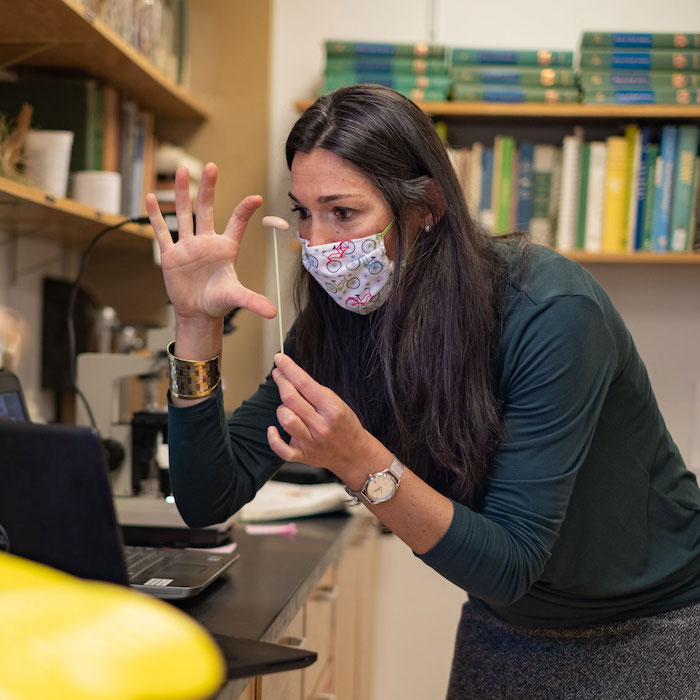Roxaneh Khorsand, visiting assistant professor in the Organismal Biology and Ecology Department and Colorado native, embodies the innovative spirit of Colorado College as she adjusts to teaching under COVID-19 restrictions. Using an array of computers, microphones, plastic models, live specimens, microscopes, and whiteboards, Khorsand converts Biology of Plants—a traditionally hands-on introductory course—into an interactive online experience for students living around the world.
“As we observe specimens under the microscope, I ask students what they see and how they interpret what they are seeing. I move the specimen around to show different angles and cell types, and I refer to figures in the lab manual and textbook so students can make their own connections.”
While she acknowledges that teaching science online is not ideal, the biology professor also observes that the new format challenges students to learn independently and to “take ownership of their education.” She remarks that students are responding well due to the “quality of learning” initiated by the structure of the Block Plan. “I am blown away by the level of awareness, work ethic, and curiosity of many students at CC. It is a pleasure to teach such receptive human beings.”
The biology professor also believes that she has grown as an educator during the pandemic, noting that she listens to students more now than in the past. “I perceive what students need and I respond to their needs only after giving them the space and time to explore the specimen on their own. Teaching lab through Zoom is a rhythmic dance between leading and listening.”
Because Zoom sessions are inherently less captivating than in-person education, Khorsand has dramatically shortened class time. This adjustment requires students to be more closely engaged as she teaches. She encourages student interest through check-ins at the beginning of class, quick jokes, consistent energy, and evident passion for the subject.
Khorsand’s enthusiasm for education remains despite the limiting conditions of the pandemic due to her lifelong interest in biology. “I became a college professor because I took the only path that felt authentic to me. I was lucky enough to know from an early age that I am passionate about the natural world. As a child, I had an insatiable desire to understand how things worked in nature, and I dreamt of saving every living being that could not speak for itself! That dream shifted as I entered ‘adulthood,’ and I questioned my idealistic approach.”
“I can’t save the world, but I can make a tiny difference. Perhaps the most sustainable path toward preserving what’s left of the natural world is through education. My aim is to help students cultivate critical thinking skills so they can make informed choices, both as scientists and citizens.”
Khorsand’s passion for her field and for her job also reveals itself as she discusses the modifications she made to her pedagogy as a result of the pandemic. “As a biologist, I understand the importance of adaptation. As faculty, we are adapting our pedagogy during this pandemic so we can serve our students and so they may continue to progress through their academic careers. In my attempt to adapt to these new circumstances, I have become more creative, more resourceful, and more receptive.”
Despite her many efforts to adapt the class as accurately as possible, Khorsand admits that online learning may be a useful tool, but that “it is not a valid substitute for human connection.” She bemoans the loss of in-person interaction with her students, arguing that “online learning cannot fully capture the essence of education because human connection between a teacher and student is felt, not seen.”
“I feel a deep sense of joy and meaning when I witness a student experience that ‘aha’ moment, or connect the theoretical to the practical, or think critically beyond the academic sphere and into the ‘real world.’”
The absence of this feeling may be striking now, but Professor Khorsand looks to the future for inspiration as she continues to adapt to the pandemic. “It will be a great day when we can share that collective energy again, whether we are in the lab or field with our students. I know better days are to come.”
Roxaneh Khorsand grew up in Littleton, Colorado. She received her B.A. in Biology and Spanish from CU Boulder, then completed her Ph.D. at Florida International University in Miami. Upon finishing her postdoc, she taught as an adjunct professor at FIU from 2014-2015. She was a faculty member at the School of Biological Sciences at the University of Northern Colorado from 2015-2018, and became a visiting professor at Colorado College in 2018.






